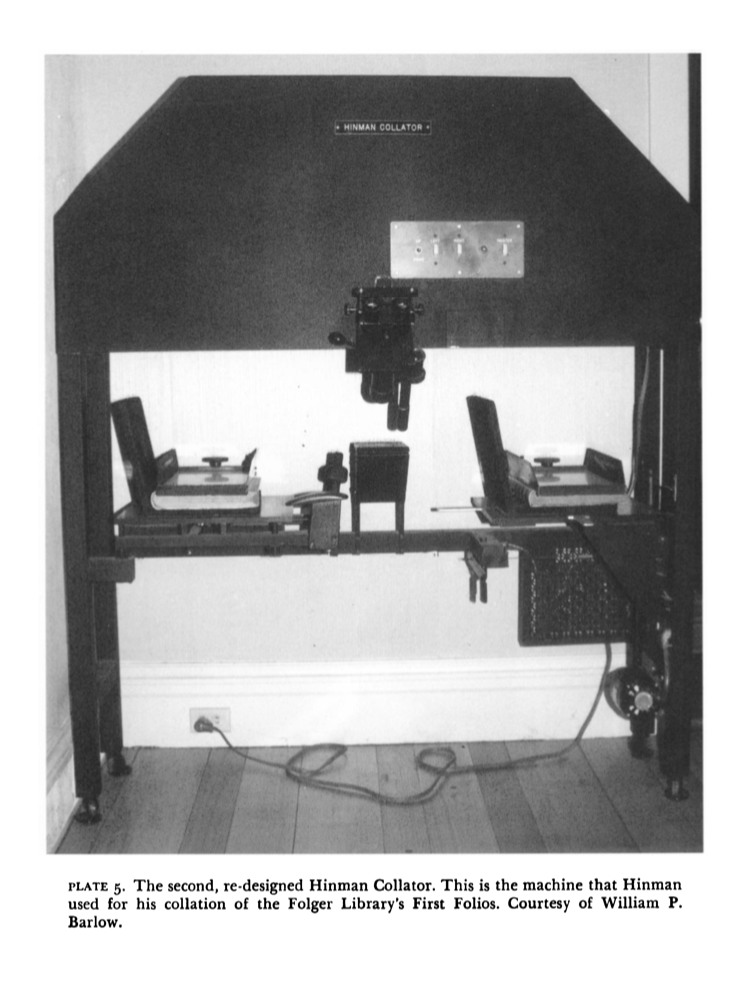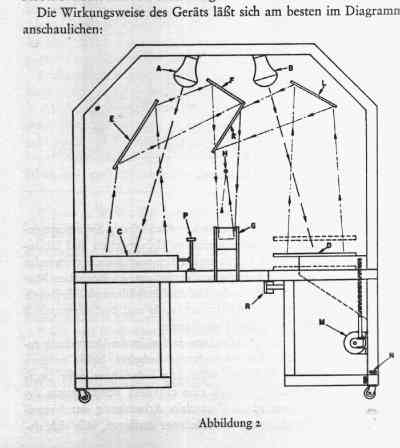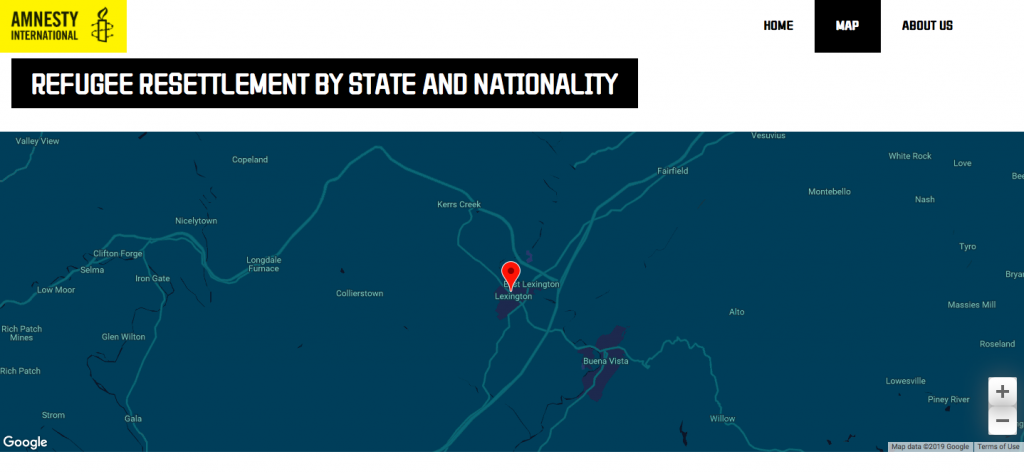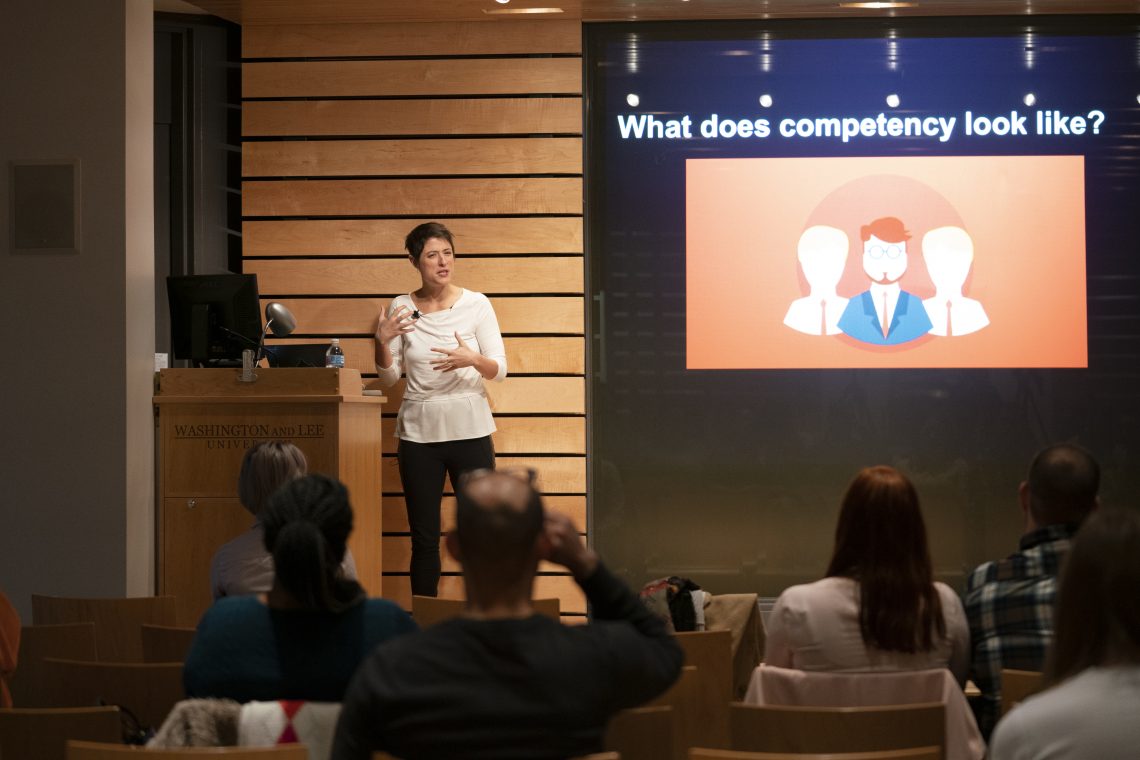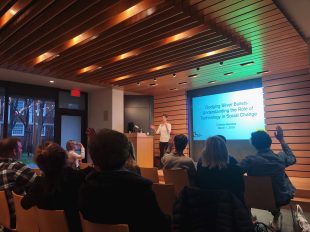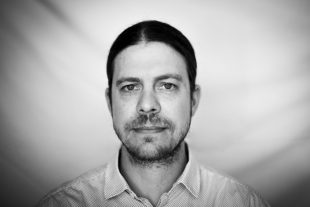Crossposted to the scholarslab blog and Brandon Walsh’s blog.
[The following post was co-authored with Mackenzie Brooks, Digital Humanities Librarian at Washington and Lee University. It follows up on a previous post on digital pedagogy and the Praxis Program. So if you’re just joining us, you might start there first. The first section below offers Brandon’s thoughts on a sequence of collaborative events with W&L, and the second section offers Mackenzie’s thoughts on the same.]
Brandon’s Perspective
In my last post, I mentioned that the Scholars’ Lab piloted a unit on digital pedagogy for the Praxis Program this past year. Over the course of a few weeks, the students each drafted the materials they would need to deliver a low-tech workshop on a digital humanities method or concept relevant to their own interests. The unit gave the students the opportunity to explore their chosen topic in dialogue with one another as they felt their way through how they would go about teaching the material to a broader audience, and it also gave the program a chance to speak directly to each student’s own reasons for being in graduate school and for exploring digital humanities. I ended that last post on something of a cliffhanger – I had intended the unit on pedagogy to end there, with each student in possession of all the makings for a DH workshop of their own design. But the students wanted to go a step further – they wanted to actually use these materials and deliver these workshops. I wanted to honor this good energy, and I’ll use this monthly installment in the Scholars’ Lab year of blogging to write a quick note about how we did so.
At the same time that the Praxis Program was running, I was in contact with the digital humanities group at Washington and Lee University about an ongoing collaboration that brings UVA graduate students working in DH to W&L to deliver one-off workshops for undergraduate DH courses. For each of these visits, the students work with the relevant faculty member to design a workshop in line with both their own research interests and the course material. It’s a challenging program to coordinate logistically – for each of these visits, W&L’s DH Librarian Mackenzie Brooks and I have to align the schedules for faculty members and students while also making good matches between interests and course syllabi. In spirit, this collaboration seemed like it could be a good fit for the new set of workshops designed by the Praxis programs. But we were not quite sure how to make it work logistically. We didn’t have obvious course fits for some of the topics, and it’s difficult to coordinate a couple workshops a semester, let alone six.
So we decided on a slightly different approach. Rather than trying to spread the workshops out among six class visits, we consolidated them. As luck would have it, this spring semester Mackenzie and Sydney Bufkin, Visiting Assistant Professor of English and Mellon Digital Humanities Fellow at W&L, were co-teaching a small capstone course for W&L students minoring in Digital Culture and Information. As a part of the course, Mackenzie and Sydney were eager for their students to get broad exposure to a range of DH topics. Rather than coordinate six individual trips from UVA to W&L, Mackenzie and Sydney suggested bringing their W&L students to UVA. With this in mind, on two separate occasions, Mackenzie and Sydney brought a group of students to the Scholars’ Lab to take part in a series of workshop sessions by our Praxis students. Because these workshops fell under the purview of the workshop exchange component of W&L’s Mellon grant, we were able to pay the students a small honorarium to compensate the extra time required to prepare the workshops over and above what we would usually expect of Praxis participants. In conversations with our Praxis students I started calling the event the Praxis DH Roadshow.
We had a lot of conversation internally about how to handle invitations for these workshops. After all, while the Praxis students were eager to deliver their work and get feedback, they were still learning about the field. We worried that throwing the doors open to the general public would be unfair to these students who were, after all, teaching in public so as to learn. We wanted to construct a space that helped to mitigate these risks, so we settled on a partially open format, aiming for about fifteen participants total in each workshop. Besides the five participants from W&L, we also counted on about five participants from the Scholar’s Lab. For the remaining audience members, we selectively invited members of the UVA community: subject librarians who would be interested in the work being done by students in their departments, experienced and generous collaborators who we could count on to offer constructive feedback, and library colleagues who might simply be interested in learning about the method under discussion. We couldn’t invite everyone, but we hoped that these targeted invitations might give our students the chance to show off the work they were doing in the library in a supportive environment.
To my mind, the events were a success in many ways. The slate of workshops the students put together was broad and diverse:
- Catherine Addington (Spanish) – Transcription and Digital Editions
- Cho Jiang (Urban and Environmental Planning) – Sentiment Mapping
- Emily Mellen (Music, Critical and Comparative Studies) – How to Cite and Work with Sound Sources in Writing
- Eleanore Neumann (Art and Architectural History) – Digital Curation
- Mathilda Shepard (Spanish) – Minimal Computing
- Chris Whitehead (History) – Network Analysis w/ String
The lineup of topics was a tad scattershot to be sure, but the goal was never to cover the broad range of things possible in digital humanities. We engaged the graduate students where they were and had their interests set the agenda. To my mind, the workshops themselves were not really for the audience. They were a chance to offer the Praxis students a chance to teach with a safety net – an opportunity they don’t often have. It also gave the students a chance to watch each other teach – something that is even more rare. But I’m very pleased that we were able to turn this exercise for graduate students at UVA into something that could be of use to the group at W&L.
I’m so pleased that Praxis could become a supportive space for pedagogical growth this year, and I’m very thankful for everyone who made it possible. I’m especially grateful to the many library colleagues who attended and shared their constructive feedback with the students (with apologies if I miss anyone): Hanni Nabahe, Lauren Work, Abby Flanigan, Brandon Butler, Maggie Nunley, Regina Carter, Erin Pappas, Keith Weimer, and Sue Donovan. The events would not have been possible without the work of Mackenzie Brooks, Sydney Bufkin, Amanda Visconti, and Laura Miller. They were each instrumental in making sure that the events took the shape they did and that they proved productive for the students. And, of course, I am very proud of and grateful to the students for sharing their work with us.
Mackenzie’s Perspective
As one of the instructors of the capstone course that Brandon mentioned, I wanted to share my perspective on the workshop roadshow and its role in our course. At the Washington and Lee University Library, we are in our first year of offering a minor in Digital Culture and Information (DCI). Sydney Bufkin and I decided to design and co-teach the capstone course this year, before we had any declared minors, as a way to test out the structure and feasibility of an upper-level digital project-based course.
We embarked on this trial with two students, both of whom had some experience with DH projects, but not much coursework in DCI. Because it was such a small course, we were able to customize the schedule to fit the needs of the students and their projects. Katherine Dau ’19 was interested in building a web map to complement her honors thesis in art history and MaKayla Lorick ’19 wanted to design a digital exhibit to house an oral history project she began the previous summer. We quickly filled our 12-week schedule with the theoretical and technological grounding necessary for our students to meet their project goals. But we still wanted our students to get a sense of the breadth of DH work.
Moreover, I knew from previous experience with UVa graduate students that they could be a great model for our undergrads as they learned new digital modes of research. As part of our ongoing collaboration with Scholars’ Lab, I regularly bring in a UVa graduate student or two in my 100-level Data in the Humanities course to introduce a new methodology (text analysis or GIS for example) and share its use in their own research. It has been a great way for my students to see someone only a little bit older than they are engaged in scholarship and the kind of experimentation that often goes on at Scholars’ Lab. I try to schedule the visits when my students are beginning to form their research questions so that they can bounce ideas off the grad students and hear someone other than me engage with their ideas.
Therefore, I was delighted to find out that this year’s Praxis students had prepared workshops they wanted to deliver. Our small class size made for an easy field trip up to Charlottesville for two marathon workshop days. The visits fell in the latter half of the course, but I think they would have worked just as well in the earlier half when we were still surveying methods. Not only did we all learn a lot from each of the workshop leaders, but our students were (gently) forced to articulate their own work for a friendly and knowledgeable audience. By the sixth workshop, they were comfortable explaining Jekyll or the reasoning behind their project name. This is what I like best about our collaboration with Scholars’ Lab – it creates an opportunity for all the people involved to learn and grow in a welcoming, low-stakes space. The Praxis students even insisted on formal feedback from us, so we took class time to fill out an evaluation form and discuss the workshops. For us, this was just a continuation of an ongoing conversation about sharing your work. Both Katherine and MaKayla had been presenting their projects to various audiences throughout the term, but the workshops helped them see new possibilities for their own emerging pedagogical practice. Most capstones will involve some kind of public presentation, but this experience reminded us that there is room for sharing and reflecting on your work in incremental ways, not just at the end of a project.
Thank you to everyone who made this event possible!
